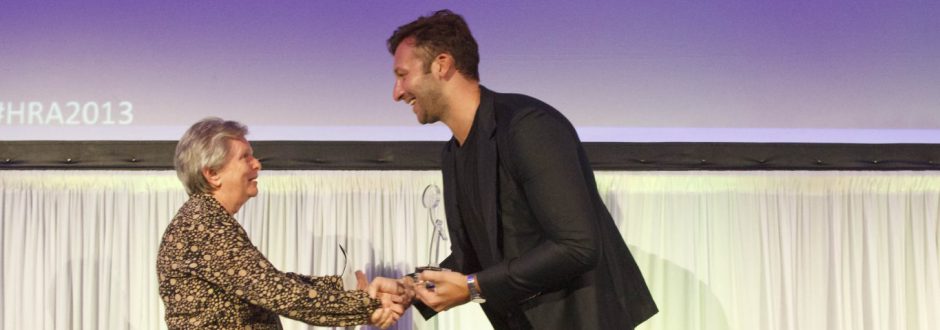Sister Clare Condon, Leader of the Sisters of the Good Samaritan, has won the 2013 Human Rights Medal.
Clare was presented with the award during a special event in Sydney last night, December 10, by 2012 Human Rights Medal winner, Ian Thorpe. The three other 2013 Medal finalists were Gurruwun (Yalmay) Yunupingu, Richard Frankland and Pastor Graham Long.
Addressing a very engaged audience of over 300 at the Museum of Contemporary Art, Clare acknowledged the strong commitment to human rights of those present, especially the other award winners and finalists, and expressed how “very humbled and inadequate” she felt to receive the award in their midst.
“But on reflection, I do so on behalf of all my Sisters of the Good Samaritan who have served human rights in Australia for 156 years.”
In particular, Clare paid tribute to her sisters throughout Australia who visit asylum seekers and refugees in detention, who befriend and work alongside Indigenous people, who support women who are homeless or escaping domestic violence, and those who educate for justice.
“But most of all I think I receive [the award] on behalf of those sisters – some of them in their 80s – who befriend the stranger in their neighbourhood and, on a daily basis, respect the integrity and dignity of each person and of creation. And for those who live in the more remote areas of Australia, in Kiribati in the Pacific, and in Bacolod in the Philippines.
“We are grassroots people; we’re ordinary people,” said Clare.
“I thank you for honouring the Sisters of the Good Samaritan this evening. May we continue to work for the dignity of every person that comes into our orbit here in Australia or elsewhere.”
Hosted by the Australian Human Rights Commission, the Human Rights Awards are held each year on International Human Rights Day – December 10 – to celebrate individuals, businesses and community organisations across Australia who have advanced human rights during the year.
The Human Rights Commission President, Professor Gillian Triggs, described Clare as a “woman of integrity, compassion and great fortitude”.
“Sister Clare has been with the Sisters of the Good Samaritan for about 40 years. During this time she has made a very significant contribution to human rights, modernising the Sisters of the Good Samaritan and broadening their human rights focus.
“Just one example is the housing support provided by the Sisters to victims of domestic violence. In the past few years, the Sisters have helped more than 5,000 women and children who have suffered domestic violence,” Professor Triggs said.
“She is never afraid to stand up for what she believes in, nor is she afraid to take her message directly to Government, relentlessly lobbying politicians to help those in need.”
Watch video highlights of the 2013 Human Rights Awards event here.
Ten human rights awards were presented during the evening. The 2013 award winners for other categories are:
Young People’s Medal: Mariah Kennedy
Mariah Kennedy is a Young Ambassador for UNICEF and the author of the children’s book, Reaching Out, Messages of Hope. At just 16 years of age, Mariah approached some of Australia’s best-loved children’s authors and illustrators for contributions to the book, which addresses social justice issues such as child labour, refugee rights and global poverty. In June 2013, Mariah’s extraordinary anthology was published by Harper Collins with all proceeds going to UNICEF.
Law Award: Professor Andrea Durbach
Professor Andrea Durbach is a member of the Faculty of Law at the University of New South Wales, and Director of the Human Rights Law Centre. Prior to joining UNSW, she spent 13 years at the Public Interest Advocacy Centre (PIAC). Before coming to Australia, Professor Durbach, represented 25 black defendants in the notorious Upington death penalty case in South Africa.
Business Award: Freedom Housing
Freedom Housing allows people with disabilities and their families to live under the same roof in homes that are privately-owned or leased. Freedom Housing operates in line with the rights and values espoused in the United Nations Convention of the Rights of Persons with Disabilities.
Community Organisation Award: The National Centre of Indigenous Excellence
The National Centre for Indigenous Excellence provides a safe and innovative space for young Aboriginal and Torres Strait Islanders to participate in life-changing programs.
Community Individual Award: Carolyn Frohmader
Carolyn Frohmader has made a significant contribution to the promotion and protection of human rights for women and girls with disabilities. She is executive director of Women With Disabilities Australia (WWDA).
Radio Award: Carol Dowling, Noongar Radio Perth, for The State of Our Children’s Hearing (30-part series)
Carol Dowling’s 30-part series highlights the prevalence of ear disease among Noongar communities in Western Australia.
Print and Online Media Award: Debra Jopson, The Global Mail, for Rock Art At Risk
Debra Jopson’s series investigates the demise of rock art sites across the nation. As a result of the articles, the NSW government took action to protect two rock art sites in the Blue Mountains.
Television Award: Naomi Chainey, Elvira Alic, Phineas Meere for No Limits
No Limits is a disability-focussed program that engages with current news and issues by hosting panel discussions, commentary and comedy. It has had a strong positive effect in giving people with disability a voice in the media.
Literature Award: Ranjana Srivastava for Dying for a Chat (Penguin Special).
Thanks to the stunning advances of modern medicine, life for many Australians is prolonged at all costs. But as Dying for a Chat shows, these life-saving measures can cause harm and suffering when used inappropriately.
